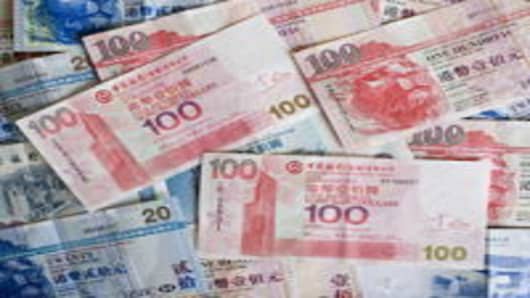The suggestion by the former head of Hong Kong's central bank that the city should review its peg to the U.S. dollar and instead think of linking it to the yuan, has not been applauded in financial circles.
Joseph Yam, the ex-chief of the Hong Kong Monetary Authority said on Tuesday that Hong Kong's focus on keeping the dollar peg was "an obsession or even paranoia." But some economists couldn't agree less.
Frederic Neumann, Co-head of Asian Economic Research for Global Banking and Markets at HSBC says he's "puzzled at the suggestion that Hong Kong should give up its peg. It has served the economy extremely well for nearly three decades."
Enzio von Pfeil, Chief Executive of Commercial Economics Asia agrees. "If it ain't broke, don't fix it. There's absolutely no reason to tinker with it," he told CNBC Asia's "The Call." "Every time Hong Kong has gone off the peg, mayhem has resulted."
Von Pfeil is referring to Hong Kong's short flirtation with a free float currency between 1974 and 1983. During that period inflation surged, from 2.7 percent in 1975 to 15.5 percent in 1980. This was coupled with erratic economic growth. The Hong Kong economy grew 0.4 percent in 1975, a year later growth surged to 17.2 percent only to come down to 2.6 percent in 1982.
In today's uncertain global economic environment, commentators say stability is key. "It's very important to portray the image to the Hong Kong public that there's going to be no change right now," Aadil Ebrahim, Managing Director at fund manager Bowen Asia, said.
Von Pfeil adds there's no reason to "ruin this very, very simple, clear, transparent system that gives businesses a lot of stability on which they can plan."
However, skeptics say this stability has come with a price. The United States’ easy monetary policy that has brought interest rates down from 5.5 percent to 0.25 percent in the last five years has pulled down Hong Kong's mortgage rates as well; and that's being blamed by some for soaring property prices.
As such, there are calls for perhaps a more intermediate approach to de-pegging the currency from the U.S. dollar. Adrian Foster, Head of Financial Markets Research for Asia Pacific at Rabobank suggests Hong Kong could mimic Singapore, where the currency is pegged to a basket of currencies.
But HSBC's Neumann can't see the benefits of this. He says "Singapore, which does maintain a basket peg has seen an equally rapid rise in real estate prices."
Von Pfeil agrees that removing the peg won't help. He says the property bubble in Hong Kong is a result of the cartels and "a lack of banking supervision whereby investors and mortgagees could put very little money to buy a flat. . . it doesn't have a lot to do with the peg at all."
By CNBC's Rethi Santra


